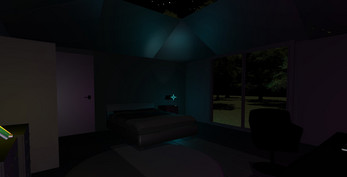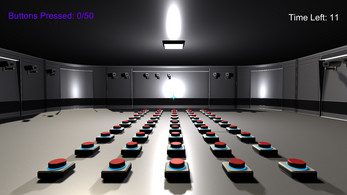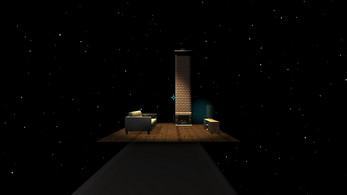The Long Night
A downloadable game for Windows and macOS
Summary:
The Long Night interprets the theme of "sustainable future" as sustaining oneself and sustaining your own future. In the context of the project, this theme is focused upon sustaining one's mental state in light of the lifestyle changes caused by the COVID-19 Pandemic.
Description:
Upon starting the game, the player finds themselves playing a nameless and faceless protagonist in the midst of a mental crisis caused by all their sudden lifestyle changes. There is no color to the player's bedroom; everything is covered in darkness with only three glowing objects to draw their attention. Upon interacting with these objects, a door opens to a portal which transports the player to a new world meant to represent one aspect of the COVID-caused lifestyle changes. The three worlds represent one of these three themes: Loneliness, Anxiety, and Burnout. Each world is designed in a surrealist style to convey to the player that they have broken from reality and have gone inside the player's mind. To exit a world and wake up in their bed, the player must locate the hidden solution in each world. Each solution is designed to represent a real-life solution to deal with the effect of anxiety, burnout, or loneliness. After finding each solution, the player is taken to a screen which gives a fuller explanation of the solution and how to apply it to their life. The player then wakes up back in their bedroom and finds that some of the darkness in their room has faded away and more objects are in color. After completing each world, more of the room is given color, and after all three are completed, the entire room is in color and the player's long night has come to an end. The player is free to exit the bedroom and go outside, upon which the game will end and the player is shown one final screen giving them hope for the future.
Team Members:
Joshua Beck - Programming
Clara Ham - Sound Design
Ean Herrera - Music
Jordan Jenkins - Art & Level Design
-------------------------------------------------------------------------------------------
The Long Night - Process Documentation
From the inception of this project we wanted to present the theme of 'Sustainable Future' through a surrealistic lens. Initially we had a lot of discussion conceptualizing different directions within which we could present this theme as it could relate to modern societal issues each of us have faced during the COVID-19 pandemic. As a team we came to a shared consensus upon our different experiences and struggles in having to shift to primarily online social interaction and workflow. Each of us felt passionate about different areas of this subject, and from here began building what would come to be known as The Long Night.
During the initial design phase, we had to select a proper medium to convey our message within. We chose Unity due to our shared familiarity with it's interface and software capabilities, not to mention the multitude of options it would allow for version control and project sharing. We initially wanted to steer away from making what could be perceived as a 'game'; the goal was to craft more of a user-experience. Unity was always a tool for creating this experience, and making it interactable, but we initially did not consider the project to be a game; in that it would have win/lose conditions, enemies, etc.
When we started building the project we discussed at great lengths what direction to take in conveying the theme. The first environment we built was the Social Distancing scene. Setting the scenes in dreamscapes allowed us to have more abstract creative expression in how we could go about communicating these ideas without taking a largely straightforward approach.
Our initial feedback wasn’t as positive as we would’ve hoped. It was difficult to accurately convey our theme to our professors in a way that they could understand. From our first demo of the project we received criticism for how dark the project was from a visual perspective, as well as an emotional perspective. People felt they could relate to issues presented, however it was bothersome to be met with some visual representation of issues that most people are already facing without presenting any sort of positive solutions. In short, our project had a problem presented, but no message or means of addressing those problems that were conveyed.
We spent a lot of time post-feedback further developing the project and figuring out ways to incorporate researched solutions to have conveyed messages that could provide insight and inspiration to the players. Additionally, we looked at ways to take the environmental designs of the dreamscapes further beyond repetitious black voids with varying changes between scenes.
We decided to expand the social distancing scene by housing it within a modern metropolitan area. We thought this would be a good way to give the environment more of an immersive feel and dynamic visual elements. Development of the other scenes came shortly after finalizing our first one. We wanted to convey anxiety with being overwhelmed by constant pinging of notifications as they try to navigate a maze. We crafted a scene to cover burnout and the need to rest one’s mind as well as one’s body.
In finalizing the development of our experience we wanted to maintain tying everything together by having the player always return to their bedroom. As the player progresses through the dreamscapes, they see their room get brighter and change overtime as a visual indication of their improved mental state from experiencing and learning from the solutions to the presented issues.
Future Application
Moving forward, we’re hoping that this project can be looked back upon by those who face similar challenges in the future that we are currently facing during the COVID-19 pandemic. We feel like this project will leave a legacy of an unconventional method of helping individuals who are unable to help themselves when faced with mental health challenges in their everyday life. The unique thing about our project is that we provide an immersive experience that also presents researched solutions to their individual struggles, as opposed to attending a therapy session or feeling the pressure of having to work themselves through their own problems. We felt using the medium of video games as a means of conveying solutions to challenges we all face in our everyday lives is the key to perpetually sustaining our future.
Audio
All of the music was created using Ableton Live.
Accumulated Research
Anxiety
In Game Solution:
Life is a lot different now than it was at the beginning of the year. Being forced into a digital setting has been hard on everyone. It seems like everytime we looks at our devices something new has popped up out of nowhere. It’s overwhelming, and it can cause a great deal of anxiety as we try to navigate through the mess. Even though our lives have gone online, don’t forget to unplug every once in a while. Turn off your devices and take some time for yourself, the world may be pulling you every which way, but you always have the option to disconnect.
Definition: a feeling of worry, nervousness, or unease, typically about an imminent event or something with an uncertain outcome.
Types:
- Generalized anxiety disorder
- Display excessive anxiety or worry most days for at least 6 months
- Can be about personal health, works, social interactions, everyday life
- Panic Disorder
- People with panic disorder have recurrent unexpected panic attacks. Panic attacks are sudden periods of intense fear that reach their peak in minutes.
- Can be triggered by feared object or situation
- Phobia Related Disorder
- Phobia is an intense fear of specific objects or situations
- Although it can be realistic to be anxious in some circumstances, the fear people with phobias feel is out of proportion to the actual danger caused by the situation or object.
Signs and Symptoms:
- Generalized Anxiety Disorder
- Feeling restless, wound-up, or on-edge
- Easily fatigued
- Difficulty concentrating; mind going blank
- Irritable
- Muscle tension
- Difficulty controlling feelings of worry
- Having sleep problems, such as difficulty falling or staying asleep, restlessness, or unsatisfying sleep
- Panic Disorder
- Heart palpitations, a pounding heartbeat, or an accelerated heart rate
- Sweating
- Trembling or shaking
- Sensations of shortness of breath, smothering, or choking
- Feelings of impending doom
- Feelings of being out of control
- Phobia Related
- May have an irrational or excessive worry about encountering the feared object or situation
- Take active steps to avoid the feared object or situation
- Experience immediate intense anxiety upon encountering the feared object or situation
- Endure unavoidable objects and situations with intense anxiety
Coping
- Control breathing (short term)
- Slowly through the nose
- Hold breath for a few seconds
- Breathing out slowly
- Repeat until the anxiety reduces and the heart rate returns to normal
- Meditation (short term)
- Helpful tool
- Stress Management
- Includes regular meditation and slow breathing exercises
- Lifestyle Changes
- Balanced diet
- Regular exercise
- Good quality sleep
- Talking to Others
- Speak with friends, family member, or a therapist
Sources:
https://www.nimh.nih.gov/health/topics/anxiety-disorders/index.shtml
https://www.medicalnewstoday.com/articles/how-to-cope-with-anxiety#quick-coping
https://www.psychologytoday.com/us/blog/in-practice/201503/50-strategies-beat-anxiety
https://www.helpguide.org/articles/anxiety/social-anxiety-disorder.htm
Loneliness
In-game solution:
You are experiencing a deep sense of loneliness.
Though you may feel alone, you can find solace in other ways of communicating. Try texting, writing a letter, calling someone, or using a video chat. Play online games with someone. If you don’t have a pet and are able to get one, they can be a great source of comfort.
Another way of combating loneliness can be through a healthy distraction. Try out a new hobby, work on your home, or read, watch, play, or listen to something you love. Additionally, physical health is tied to mental health, so having a habit of healthy eating, starting an exercise routine, meditating, and getting a proper amount of sleep are all ways you can make your mental state more positive. If others aren’t available, be your own friend.
After realizing there is hope, you start to feel better and find yourself back in your room.
Definition:
- A mental health disorder characterized by persistently depressed mood or loss of interest in activities, causing significant impairment in daily life.
Symptoms:
- Depression
- Impact on physical health and emotional health
- Physical Pain
Coping:
- Join a class or take up a social hobby
- Volunteer
- Find support online
- Strengthen existing relationships
- Get a pet
- See a therapist
Sources:
https://www.nytimes.com/2020/04/20/smarter-living/how-to-manage-your-loneliness.html
https://www.verywellmind.com/how-to-cope-with-loneliness-3144939
https://www.verywellmind.com/how-to-cope-with-loneliness-during-coronavirus-4799661
https://cmha.bc.ca/documents/coping-with-loneliness/
https://www.medicalnewstoday.com/articles/320534
Burnout
In game solution:
School and work are important, but so is your mental state.
Right now things are difficult, and you might be experiencing larger work loads than you’re used to, but don’t forget that you’re only human, and trying to handle everything all at once is only setting yourself up for failure.
Always remember to take a break from your work, and once you’re feeling better, you can get right back to it.
Definition:
- a state of physical or emotional exhaustion that also involves a sense of reduced accomplishment and loss of personal identity.
Symptoms:
- Severe stress, fatigue, problems sleeping due to work or school work
- Dreadful feeling about attending school or going to work.
- Worrying about work even when you’re at home during your free time
- Feelings of ineffectiveness
- Experiencing more physical problems like headaches
Coping:
- Try to get more sleep
- Do exercise regularly
- Studies show that exercise can significantly reduce burnout symptoms in as little as four weeks.
- Practice Yoga
- Practice mindful breathing
- Make time for self care
- Talk to those who you trust
Sources:
https://www.helpguide.org/articles/stress/burnout-prevention-and-recovery.htm
https://psychcentral.com/blog/5-ways-to-cope-with-burnout/
https://karinsieger.com/burnout-reasons-symptoms-coping/
https://blog.rescuetime.com/burnout-syndrome-recovery/





Comments
Log in with itch.io to leave a comment.
I really liked the concept behind your game! While the movement was a little annoying at times and I couldn't find one of the solutions for a while but overall really enjoyed the playthrough.